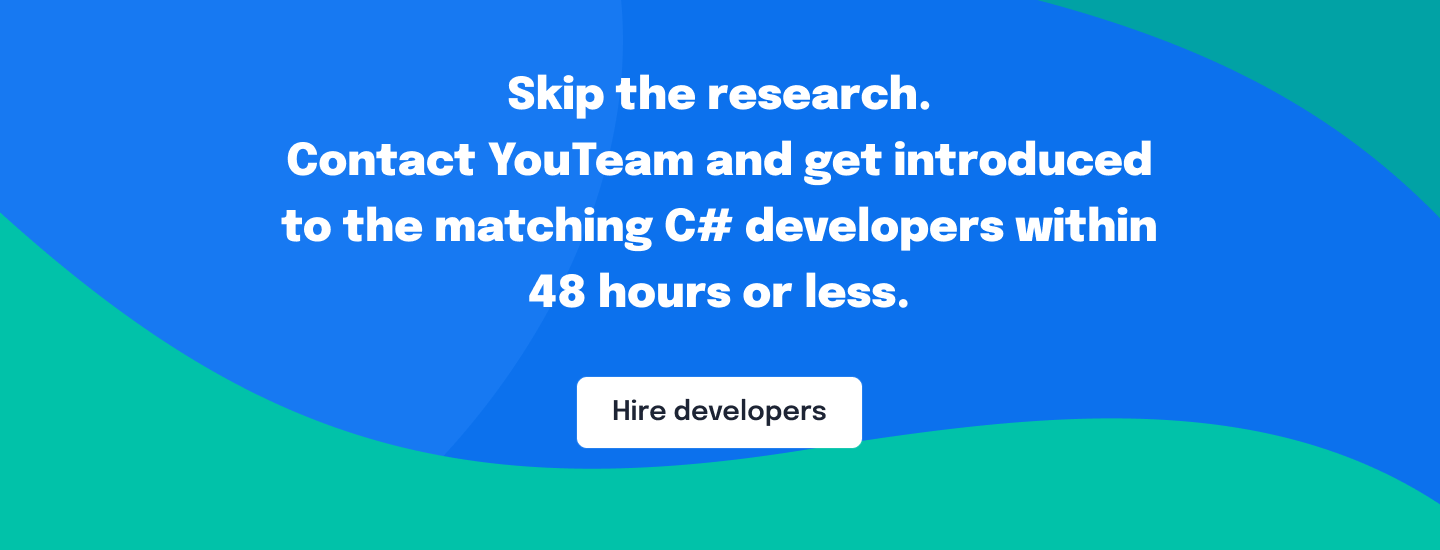This article covers essential tips for hiring an experienced C# software developer. We discuss defining core skills, creating an effective job description, choosing technical questions, and crafting an onboarding plan for a new hire.
You will also learn about reflecting your company culture while outlining interpersonal skills critical for your project’s success. Additionally, we provide information on hiring platforms that support flexibility in scaling up or down development teams.
Table of Contents
Steps to hire C# developers
We’ll start with the very first step: defining the project requirements. This process will have a significant impact on determining the number of developers needed to successfully complete the project, their experience, and skill set.
1. Identify the project requirements
When creating a project description, companies define the technical stack, build a roadmap, discuss how to mitigate potential development issues, and match the software cost to the company’s budget. The steps for creating a project description may look like the following:
- List software product’s functions and objectives and define its audience.
- Identify modules, components, libraries, and other software requirements.
- Create a roadmap that defines the sequence of component development.
- Create a storyboard or wireframe that shows how all the components will fit together.
- Define the project’s tech stack that includes languages, technologies, and third-party resources. Compare these technologies to what you can and cannot cover with your existing team (in-house and external providers).
- Identify and evaluate issues that may impact the development process, such as research and development (R&D) for a new application or obtaining regulatory approval.
- Determine a delivery date or deadline.
- Estimate the labor and cost of the software product using a Gantt chart.
Read more about gathering information from all stakeholders and defining project requirements in our article, ‘Stakeholder Communication and Project Requirements for PMs’.
2. Define core skills and expertise required for the C# developer position
Choose relevant definitions based on the required level or depth of C# and .NET knowledge for the role. ‘Working knowledge’ usually implies that the developer understands basic principles and terminology and can solve simple problems. Meanwhile, ‘thorough’ and ‘comprehensive knowledge’ typically suggest complete mastery, confidence in solving complex problems, and the ability to advise on technical issues, serving as a source of knowledge for other engineers in the company.
In addition to the crucial C# and .NET skills and certifications, include non-essential ‘nice-to-have experience with’ technologies, API interfaces, frameworks, and techniques. You may also want to mention software architectural patterns, design principles, and mathematical models that you believe would enhance the developer’s job success.
3. Identify the soft skills critical for your company
Requirements such as “having excellent written and verbal communication abilities” are often overused and represent the most general description of interpersonal skills. Therefore, many companies tend to skip this requirement in their job descriptions. Instead, it is more effective to emphasize that this position requires active participation in Agile ceremonies and brainstorming sessions to solve complex problems. In addition, you may want to highlight the following:
- Flexibility: The ability to adapt to changing business processes and technologies (if your project demands high flexibility).
- Constructive feedback: The ability to identify process bottlenecks and propose in-depth solutions.
- Collaborative skills: The ability to work independently and contribute to a combined team effort to achieve common goals.
4. Create a job description
Now that you have identified the desired qualifications and interpersonal skills, describe duties and responsibilities such as analyzing user needs, developing and maintaining software solutions, analyzing and designing databases, and directing software system testing and validation procedures. Explaining the essential functions will help the candidate understand the structure of the workflow. Here are some tips:
- When describing responsibilities, focus on project deliverables.
- Identify the developer’s decision-making areas.
- Specify the people to whom the developer will report.
- Address the supervisory responsibilities expected from the role.
You should also mention benefits to show that your company supports software engineers with the resources they need to thrive, both professionally and personally. Benefits may include equal opportunities and an inclusive environment, flexible working hours, education reimbursement, health insurance, and unlimited paid time off.
5. Prepare technical questions
The interview can start with general questions about the C# developer’s education and work experience. You can further discuss the candidate’s professional qualities and recent accomplishments in C# and .NET programming, using the following examples:
- What are you looking for in your next position?
- What are your best professional qualities?
- What do you enjoy about being a C# developer?
- What were your recent professional accomplishments using the C# programming language and the .NET ecosystem? Describe the projects in which you have been particularly successful.
- How long would it take you to learn a new framework, master a new design principle, or build a skill set?
- What C# and .NET features do you find difficult to use?
In addition, you can discuss the depth of the engineer’s technical knowledge with advanced questions:
- What are the different types of classes in C#?
- Explain how file handling works in C#.
- Which types of locking mechanisms do you know in C#?
- How does the lazy loading approach function?
- Can you tell the difference between overloading and overriding?
6. Create a test assignment (or use third-party platforms for technical assignments)
Examples of coding assignments for verifying problem-solving abilities and comprehension of C# concepts include:
- Take-home coding challenges
- Real-world projects
- Multiple-choice questions
- Remote pair programming
- Virtual system design and whiteboarding
Take-home assignments can be the best way to evaluate a C# developer’s technical skills, as they involve solving a real-world business problem that a company has faced before. However, candidates might perceive take-home challenges as ‘free work’ if the company does not pay for their completion. Meanwhile, tests that are too lengthy can frustrate candidates and increase the likelihood of them dropping out of the hiring process.
In addition to creating in-house coding assessment environments, hiring managers can assess C# developers’ skills using technical screening platforms such as Woven and Hatchways. These platforms offer an automated and standardized process, allowing for an unbiased review of candidates’ performance. However, critics of online testing platforms note that the questions may have little relevance to what developers do on a daily basis.
7. Provide feedback
Providing feedback to all candidates, regardless of their performance in the interview and coding tasks, is essential to establish your company as a human-centric brand. If a developer doesn’t pass a certain interview stage, add more details about areas where they can improve and provide resources and books that would help them become the perfect candidate for the position.
Choosing a platform for hiring C# developers
We provide four options to hire remote C# developers for businesses that need to quickly scale up or down their development team, acquire specialized skills without the commitment of permanent employment, and delegate non-essential tasks to outside vendors.
1. YouTeam
YouTeam is a network of 50,000 vetted software engineers from hundreds of development agencies located in Latin America and Europe. Serving as a single point of access to software talent experienced with remote work in fast-paced environments, it enables companies to scale their development teams up or down.
When YouTeam adds an agency to the network, it conducts meetings with its CEO, CFO, and project managers. Simultaneously, its legal team performs compliance checks on the agency’s background, legal records, and previous clients.
In addition to vetting software agencies, YouTeam conducts in-depth screenings of potentially suitable candidates for each open position. The platform also provides each client with a matching expert who remains with the company throughout the entire collaboration with contractors. This expert assists with onboarding, scaling the team up or down, and handling replacements. YouTeam also automates contract signing and billing processes between its clients and software development agencies.
2. Arc
Arc.dev is an online platform that helps companies find and hire software developers and engineering consultants. The platform offers both permanent full-time engineers and part-time freelancers, readily available for interviews. Arc evaluates candidates for compatibility with remote work, English proficiency, and communication skills. Applicants also undergo technical interviews and pair programming sessions.
The Arc team assists companies with onboarding and conducts regular reviews of developer projects to ensure performance meets their quality standards. According to its website, Arc developers are located in the U.S., Europe, and Latin America.
3. Toptal
Toptal is a platform that offers remote developers for mission-critical software projects. Toptal interviews its developers for language proficiency, interpersonal skills, and problem-solving abilities. Additionally, each candidate undergoes live coding tests and completes a real-world project.
Toptal assigns an industry expert to the client to understand their goals, technical needs, and team dynamics. The expert then accompanies the new developer through a trial period, ensuring they are the right fit before starting the engagement.
4. Turing
Turing is a hiring platform that offers full-time software contractors and managed teams. It facilitates automatic time tracking, virtual daily stand-ups, and time zone management to provide clients with greater visibility into remote developers’ work.
The company evaluates developers for English fluency and proficiency in programming languages, data structures, algorithms, system designs, and frameworks. Each developer also undergoes an automated work experience survey that includes questions in five areas: project impact, engineering excellence, communication, people, and direction.
Turing developers are required to have a 4-hour overlap within the client’s timezone to ensure successful communication.
In addition to providing contract engineers, Turing offers IT services such as cloud migration, data engineering, AI implementation, and application assessment.
Comparison Table
| YouTeam | Arc | Toptal | Turing | |
| Pool of developers | Full-time employed engineers from software development agencies | Part-time freelancers, full-time contractors | Freelancers | Full-time contractors, managed teams, custom software engineering |
| Pricing | YouTeam’s commission is 10% of the developer’s rate. The average rate of a senior engineer is $60/hour or $9K/month. | A custom fee per hire.
Permanent contractors’ yearly salaries range from $50,000 to $200,000. Freelance contractors’ hourly rates range from $60-$100/hour. |
Developers’ hourly rates range from $100-$150/hour.
Requires an initial deposit of $500 as a credit to the first invoice once you make a hire. The deposit is refundable. |
Turing’s service fee (TBD) |
| Geography | Developers located in Latin America and Eastern Europe | Most of the developers are located in the U.S., Europe, and Latin America. | Most talent located in the Americas and Europe | Worldwide |
| Vetting | – Compliance checks into each agency’s background, legal records, and previous clients
– English pre-interview – Soft skills interview – Tech interview – Verifying the skillsets through Hatchways |
– Application screening
– Coding assessment – Hands-on project – Behavioral interview – Technical interview with a senior engineer |
– Language, personality, and communication interview
– Technical interview – Live tests to evaluate coding experience – Real-world test project |
– Automated technical skills test
– English proficiency test – Live coding interview – Communication skills interview |
| Quality guarantee | Risk-free 1 month trial period | – Risk-free trial period of up to two weeks (for freelance positions)
– 3-month guarantee (for permanent roles) with the option to be matched with another developer free of charge |
Trial period of up to two weeks | Risk-free two-week trial period |
| Time to get a verified list of candidates | 2 business days | 3 days | 48 hours | 3 to 5 business days |
| Time to contract | 1 week | 2 weeks for full-time roles;
24-72 hours for hourly contractors |
0-3 weeks | No data |
Crafting a C# developer onboarding plan
The first few weeks in the company may be both exciting and overwhelming for a software developer. A new employee onboarding plan will help them better understand the company’s needs and build relationships within the team. It may consist of the following steps:
- Prepare a guide with the company’s most crucial information, including blog posts about company milestones, product presentations, and a glossary of company acronyms.
- Consider a C# developer’s goals for the trial period and the first 6 months of work. This may include gaining a more in-depth understanding of the tech stack and operational footprint.
- Assign a technical specialist to introduce the developer to the project code.
- Clarify the new contractor’s position with other team members whose work is closely related. This will improve interaction and knowledge sharing within the team.
- Start with simple tasks to avoid overloading the developer with information, and regularly evaluate their work.
- Organize pair programming sessions to ensure the developer stays on track.
- Schedule regular Q&A and feedback sessions.
To learn more about how to successfully manage the onboarding process, read our guide, “Remote Developer Onboarding Checklist: How to Start Working with a Contractor.”
Closing remarks
We hope these tips help you in finding the right C# developer for your project. The better you prepare for the candidate selection, the more likely you are to find a person who will be a good fit in the long run.
If you are interested in learning about other aspects of hiring C# developers, we also recommend that you check out the “Complete Guide to Hiring a C# Developer in 2023.” This guide covers hiring approaches based on region and engagement type, average global C# developer salaries, and monthly and hourly rates for offshore C# developers in the most promising countries for outsourcing.






